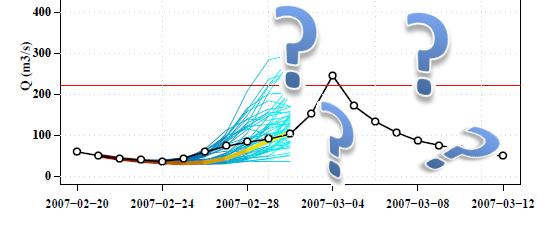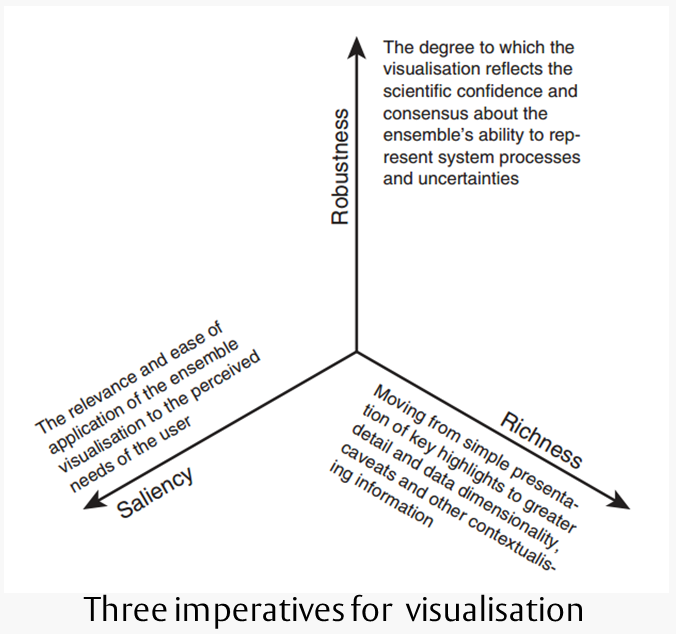Hydrological Forecasting and Predictive Uncertainty: Advances and Challenges of Transferring Science into Operational Practice (IAHS Workshop)
If you are curious about:
 How to efficiently postprocess atmospheric predictions for their use in hydrologic models?
How to efficiently postprocess atmospheric predictions for their use in hydrologic models?- How to produce reliable probabilistic predictions of extremes in hydrology?
- How to evaluate probabilistic hydrologic forecasts in a manner that is meaningful to users and adapted to their decision-making contexts?
- How to combine various techniques for reducing and estimating hydrologic predictive uncertainty (e.g., ensembles and/or multi-models, data assimilation and post-processing)?
- How to make efficient use of estimates of predictive uncertainty in practice?
- How can users be more engaged in the definition and development of novel, probabilistic products that respect their needs for warning time, accuracy and reliability?
Then, you may be willing to participate to the workshop that will be organized under the auspices of HEPEX at the next IAHS Assembly at IUGG2015 to be held in Prague, Czech Republic, from 22 June to 2 July 2015.
A workshop focusing on operational practices
We know that a large number of operational applications may benefit from hydrological forecasting systems that issue reliable and accurate predictions: flood warning, drought risk management, reservoir control, water use planning, hydropower production, etc.
In this workshop, we want to collect experiences that address scientific developments in hydrological forecasting and uncertainty assessment, and the needs of practitioners, decision- and policy-makers. We want to learn more about best practices identified to be useful and efficient when facing the challenges of transferring science into operational practice to respond to stakeholders and societal needs.
Our aim is to identify challenges and discuss solutions in implementing, visualizing, using and communicating uncertain predictions in operational practice.
Understanding how decisions are made: “We need to effectively communicate where we are in terms of the science and where we might be in the future, as well as of course the communication challenges associated with the uncertainty in the forecasts” (source: Liz Stephens’s presentation at 10th Anniversary HEPEX Workshop. See paper here)
IAHS-Panta Rhei and the HEPEX initiative
We believe that the workshop will also be an opportunity for the HEPEX community to highlight how the new IAHS decade, Panta Rhei, and the HEPEX initiative can be complementary in fostering hydrological sciences and applications for the benefit of society.
Panta Rhei is the new scientific decade 2013–2022 of IAHS, dedicated to research activities on change in hydrology and society:
“The purpose of Panta Rhei is to reach an improved interpretation of the processes governing the water cycle by focusing on their changing dynamics in connection with rapidly changing human systems.”
HEPEX topics and aims, focusing on the development of innovative probabilistic forecasting approaches for better predictions in the water resources management and water risk sectors, can contribute to Panta Rhei.
The high “science-society” interaction achieved by HEPEX through the last decade highlight the importance HEPEX gives to the users of probabilistic forecasts and decision-makers. The last workshop organized in Maryland to celebrate 10 years of HEPEX showed the important role of end-users in establishing ensemble predictions as the preferable way to go.
Leave us your opinion
- How can HEPEX and Panta Rhei contribute together to improve the science of hydrological predictions?
- How can HEPEX’s experience in engaging users in operational probabilistic forecasting be exchanged and enriched with the Panta Rhei decade?
Comments are welcome!
_____________________
Visit this website to learn more about the program IAHS has put in place.
Abstract submission: 31 January 2015.
The session HW17 will be convened by: Maria-Helena Ramos (Paris, France), Walter Collischonn (Porto Alegre, Brazil), Fredrik Wetterhall (Reading, U.K.), Andy Wood (Boulder, USA), Jan Verkade (Delft, The Netherlands), Jutta Thielen (Ispra, Italy), Massimiliano Zappa (Zurich, Switzerland), Marco Borga (Parma, Italy), François Anctil (Québec, Canada), Qingyun Duan (Beijing, China), Q.J. Wang (Highett, Australia)
Contact any of us if you have questions or suggestions!

February 2, 2015 at 11:15
The IAHS abstract submission deadline is extended to Sunday 8th February.
Read here for more info.
Guidelines for abstract submission can be found here.
There is still time to submit your contribution and take the opportunity to participate to this meeting.
We are looking forward to seeing you in Prague!
Co-conveners.